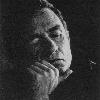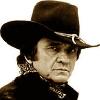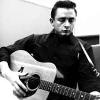

Reverted to version as of 0341, 24 September 2006 Topics: Entertainment, Music Tags: Johnny Cash View |
Tags: Johnny Cash View |
Tags: Johnny Cash View |
|||||||||
John R. "Johnny" Cash (February 26, 1932 - September 12, 2003), born J. R. Cash, was an American (United States of America) singer-songwriter, actor, and author, who has been called one of the most influential musicians of the 20th century. Although he is primarily remembered as a country music artist, his songs and sound spanned many other genres (Music genre) including rockabilly and rock and roll?especially early in his career?as well as blues, folk (folk music), and gospel (Gospel music). Late in his career, Cash covered (Cover version) songs by several rock (Rock music) artists, among them the industrial rock band Nine Inch NailsDAngelo J (August 26, 2003). "Johnny Cash says unlike most videos, Hurt wasnt too painful". MTV. Retrieved 2010-01-20. and the synthpop band Depeche Mode.
Cash was known for his deep, distinctive bass-baritone voice;Although Cashs voice type endured over the years, his timbre changed noticeably: "Through a recording career that stretched back to 1955", Pareles writes, Cashs "bass-baritone voice went from gravelly to grave".Urbanski D (2003). The man comes around: The spiritual journey of Johnny Cash. Lake Mary, FL: Relevant Media, p. xiv. for the "boom-chicka-boom" freight train sound of his Tennessee Three (The Tennessee Three) backing band; for his rebelliousness,Streissguth M (2006). Johnny Cash: The biography. Philadelphia: Da Capo, p. 196. coupled with an increasingly somber and humble demeanor; for his provision of free concerts inside prison walls;Streissguth M (2005). Johnny Cash at Folsom Prison: The making of a masterpiece. Cambridge, MA: Da Capo. and for his dark performance clothing, which earned him the nickname, "The Man in Black".For Cash, black stage attire was a "symbol of rebellion—against a stagnant status quo, against ... hypocritical houses of God, against people whose minds are closed to others ideas"; Cash J; Carr P (2003). Cash: The Autobiography. San Francisco: HarperCollins, p. 64. He traditionally started his concerts by saying, "Hello, Im Johnny Cash."
Much of Cashs music, especially that of his later career, echoed themes of sorrow, moral tribulation and redemption. His signature songs include "I Walk the Line", "Folsom Prison Blues", "Ring of Fire (Ring of Fire (song))", "Get Rhythm" and "Man in Black (Man in Black (song))". He also recorded humorous numbers, such as "One Piece at a Time" and "A Boy Named Sue"; a duet with his future wife, June Carter, called "Jackson (Jackson (song))"; as well as railroad songs (List of train songs) including "Hey Porter" and "Rock Island Line (Rock Island Line (song))".For discussion of, and lyrics to, Cashs songs, see Cusic D (Ed.) (2004). Johnny Cash: The songs. New York: Thunders Mouth.
Cash, a devout but troubled Christian (Christianity),Urbanski (2003). has been characterized "as a lens through which to view American contradictions and challenges."Clapp (2008), p. xviii.Other appraisals of Cashs iconic value have been even bolder. Clapp (2008) writes: "Very few figures in recent history are seen as more representative of American identity as Cash ... His has often been suggested as the face that should be added to the select pantheon on Mt. Rushmore (Mount Rushmore)", p. xvi.See also Miller S (2003). Johnny Cash: The life of an American icon. London: Omnibus, p. 227. A Biblical scholar (Biblical studies), he penned a Christian novel entitled Man In White, and he made a spoken word recording of the entire New King James Version of the New Testament. Even so, Cash declared that he was "the biggest sinner of them all", and viewed himself overall as a complicated and contradictory man.Urbanski (2003), pp. xx-xxi.For example, Urbanski (2003, p. 39) notes that Cashs habit of performing in black attire began in a church. In the following paragraph, Urbanski (pp. 39-40) quotes Cash (cf. Cash & Carr, 2003, p. 64) as indicating that this habit was partially reflective of Cashs rebellion "against our hypocritical houses of God". Accordingly, Cash is said to have "contained multitudes", and has been deemed "the philosopher (Philosophy)-prince of American country music".
Background: solo_singer
Birth Name: J. R. Cash
Date of birth: 1932-02-26
Birth Location: Kingsland, Arkansas, Kingsland, Arkansas, U.S.
Date of death: 2003-09-12
Instrument: Vocals (lead vocalist), guitar, piano, harmonica, mandolin
Genre: Country (Country music), rock and roll, folk (Folk music), gospel (Gospel music), blues
Occupation: Singer-songwriter, musician, actor
Voice Type: Bass-baritone
Years Active: 1955-2003
Associated Acts: The Tennessee Three, The Highwaymen (The Highwaymen (country supergroup)), June Carter Cash, The Statler Brothers, The Carter Family, The Oak Ridge Boys, Area Code 615 (Area Code 615 (band))
Website: www.johnnycash.com/
Notable Instruments: Martin Acoustic Guitars (C. F. Martin & Company)�ber Pro Audio LLC (2009). ''Johnny Cash—Guitars and Equipment''. Retrieved on 2009-05-15.



